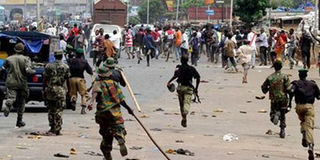Hundreds of bodies in streets after Nigeria unrest

Nigeria military personnel clash with militant youths in Onitsha, southeastern Nigeria. Photo/REUTERS
Nigerian authorities collected hundreds of bodies from the streets of the northern city of Maiduguri on Friday following days of clashes with members of a radical Islamic sect.
State government and health ministry officials piled the corpses, some of them swollen after lying in the streets for days, onto open trucks as police and soldiers patrolled.
"As of yesterday we had more than 200 dead bodies," Aliyu Maikano, northeastern zone disaster management officer for the Nigerian Red Cross, told Reuters, adding that bodies were still being collected.
The toll in Maiduguri brings to at least 300 the total number of people killed in violence that has erupted in several states around northern Nigeria since Sunday.
The authorities are hoping the killing of sect leader Mohammed Yusuf, whose Boko Haram movement wants a wider adoption of sharia (Islamic law) across Africa's most populous nation, will bring an end to the six-day uprising by his followers.
Yusuf, 39, was shot dead while in police detention late on Thursday. Officials have said he died in a shoot-out while trying to escape but rights groups have condemned what appeared to have been an execution-style killing.
Hundreds of people gathered to see Yusuf's corpse, laid on the ground in front of Maiduguri police headquarters alongside the bodies of other presumed Boko Haram members.
"I want to see the body of Mohammed Yusuf to know the man who has caused us so much pain and hardship. May his soul rot in hell," said one Maiduguri resident, Nasir Abba, in whose neighbourhood some of the heaviest fighting took place.
Eric Guttschuss, Human Rights Watch researcher for Nigeria, described Yusuf's killing as "a shocking example of the brazen contempt by the Nigerian police for the rule of law".
A Reuters reporter earlier counted 23 bloodied bodies with what appeared to be fresh bullet wounds, among them a former state commissioner for religious affairs believed to be a Boko Haram supporter, Alhaji Buji Fai.
"Alhaji Buji Fai was killed along with other fleeing Boko Haram in an exchange of fire this morning along Benishek-Maiduguri road," said Isa Azare, spokesman for the police command in Maiduguri.
Wounded and displaced civilians
Maikano of the Red Cross said 182 people were being treated at two hospitals in Maiduguri for gunshot wounds, machete blows, knife wounds and beatings.
"These are civilians ... we have not identified any Muslim sect members among these injured," he said, adding army doctors and nurses were helping civilian medics.
He said around 3,500 displaced people were still sheltering in barracks but, encouraged by the killing of Yusuf and other leading sect members, many had started to return home.
The uprising began on Sunday when members of the group loosely modelled on the Taliban in Afghanistan and whose name means "Western education is sinful" -- were arrested in Bauchi state on suspicion of plotting to attack a police station.
Yusuf's supporters, armed with machetes, knives, home-made hunting rifles and petrol bombs, then rioted in several states across northern Nigeria, attacking churches, police stations, prisons and government buildings.
President Umaru Yar'Adua said the group was procuring arms and learning to make bombs in order to impose its ideology on Nigerians by force. He ordered the security forces to do everything necessary to contain the sect.
At least a dozen soldiers, police officers and prison officials are among the hundreds killed in the unrest.
Yar'Adua, on an official visit to Brazil, has urged traditional and religious leaders to use Friday prayers to warn people about the dangers of such sects.
Boko Haram's views are not espoused by the majority of Nigeria's Muslim population, the largest in sub-Saharan Africa.
The country's Muslim umbrella group, Jama'atu Nasril Islam, has already condemned the violence.
Yusuf's death deprives intelligence agencies of the opportunity to question him about possible links to other militant groups outside Nigeria.




